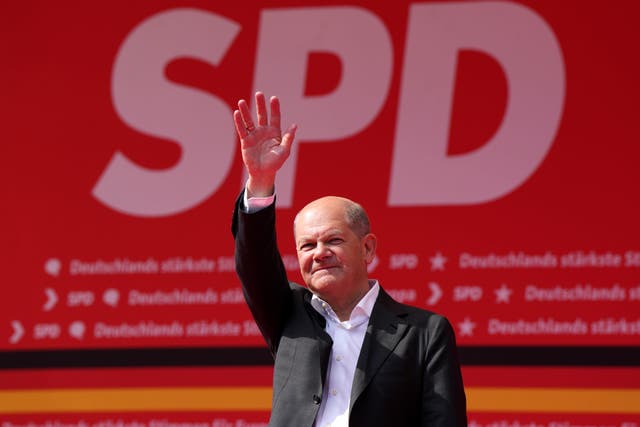Key races to watch as 400 million vote in European elections

Nearly 400 million European Union citizens have been going to polls this week to elect members of the European Parliament, or MEPs, in one of the biggest global democratic events.
Voters are casting ballots in two dozen languages in 27 countries with scores of different campaign issues.
Here are some of the key races to watch:
– Hungary
Long-serving Prime Minister Viktor Orban is expected to extend his party’s nearly 15-year streak of election victories, but is facing one of the most formidable challenges of his career from a former ally.
Mr Orban’s right-wing populist Fidesz party has taken more than 50% of the vote in the last three EU elections, and looks poised to take the most votes again this year.
But a new opposition force, headed by a former Fidesz insider turned Orban critic, has in a matter of weeks grown to become Hungary’s largest opposition party, and will likely cause Fidesz to lose at least one seat in the Parliament.
Mr Magyar’s party, Respect and Freedom (TISZA), has presented itself as a more centrist alternative to Mr Orban’s brand of illiberal populism, and is likely to gain several seats in the EU legislature. It has also capitalised on an economic crisis and disaffection with Hungary’s traditional opposition parties to siphon away much of their support.
Still, the social democratic Democratic Coalition, as well as the liberal party Momentum, could retain some of their seats, while the far-right Our Homeland party may send its first-ever delegate to Brussels after the Sunday vote.
Mr Orban has cast the election as an existential struggle between war and peace, telling voters that casting their ballots for his opposition would draw Hungary directly into the war in neighbouring Ukraine and precipitate a global armed conflict. He has been in power since 2010.
– Italy
Premier Giorgia Meloni’s Brothers of Italy party, which has neo-fascist roots, is forecast to sharply expand its number of seats in the European Parliament from seven in the last election, which could extend her influence in the EU.
Her pro-Ukraine and Israel policies have proven reassuring to centrist American and European allies, but she is leading culture wars at home that preserve her far-right credentials.

Polling data forecasts that Brothers of Italy will get about a quarter of the vote, on par with the results of the 2022 national elections but well ahead of the last European parliamentary vote in 2019. The centre-left Democratic Party is polling to come in second, followed by the opposition 5-Star Movement.
Italians ages 18 and over are eligible to cast ballots to elect 76 European parliamentary seats over two days, on Saturday and Sunday.
– France
Far-right leader Marine Le Pen and the anti-immigration, nationalist ideas she has long championed are expected to be big winners in the EU elections.
Pollsters expect her National Rally party to win the most of France’s 81 seats, well ahead of President Emmanuel Macron’s moderate pro-business party.
The National Rally’s lead European Parliament candidate, Jordan Bardella, promises to limit free movement of migrants within the EU’s open borders and dial back EU climate rules. The party no longer wants to leave the EU and the euro, but to weaken it from within.

On the left, polls show a surprising resurgence of France’s Socialist Party behind lead candidate Raphael Glucksmann, who pledges a more ambitious climate policy and protections for European businesses and workers.
Some left-wing voters are frustrated with the staunch pro-Palestinian stance of the influential far-left France Unbowed party. France has the largest Jewish community in Europe, as well as one of the largest Muslim populations, and the Israel-Hamas war has been a flashpoint in the election campaign.
– Germany
In Germany, which will have the largest number of the new European Parliament’s 720 seats at 96, the three parties in centre-left Chancellor Olaf Scholz’s unpopular governing coalition risk being punished by voters because of persistent squabbling and a weak economy.
The mainstream centre-right opposition hopes to benefit and maintain its position as the strongest German party in Brussels as it looks ahead to a national election expected in the fall of next year.

The party can expect to make gains on its performance in 2019, but perhaps not as much as it hopes.
– Slovakia
Voters cast ballots just weeks after an attempt to assassinate populist Prime Minister Robert Fico.
Analysts expect the event that sent shockwaves through the nation of 5.4 million to be a boost for turnout, which was the lowest of the entire bloc in 2014 and 2019. It is also predicted to increase the chances of Mr Fico’s leftist Smer (Direction) party, the senior partner in the governing coalition, to win the vote.

Two other political groups are far behind: the Republic, a far-right party that wants Slovakia out of Nato; and Hlas (or the Voice), another leftist coalition party previously led by Mr Fico’s close ally Peter Pellegrini, who will be inaugurated as the country’s president next week.
Slovakia contests 15 seats in the election.
Related
A New Book Argues That What Happens in Europe Doesn’t…
Remaking the World: European Distinctiveness and the Transformation of Politics, Culture, and the Economy by Jerrold Seigel “No issue in world
Poland plans military training for every adult male amid growing…
Poland’s prime minister, Donald Tusk, has said his government is working on a plan to prepare large-scale military training for every adult male in response t
2025 European Athletics Indoor Championships: Ditaji Kambundji secures women’s 60m…
Switzerland’s Ditaji Kambundji walked away from the 2025 European Athletics Indoor Championships in Apeldoorn on 7 March with much more than her first Europea
Takeaways from the EU’s landmark security summit after Trump said…
BRUSSELS (AP) — European Union leaders are trumpeting their endorsement of a plan to free up hundreds of billions of








